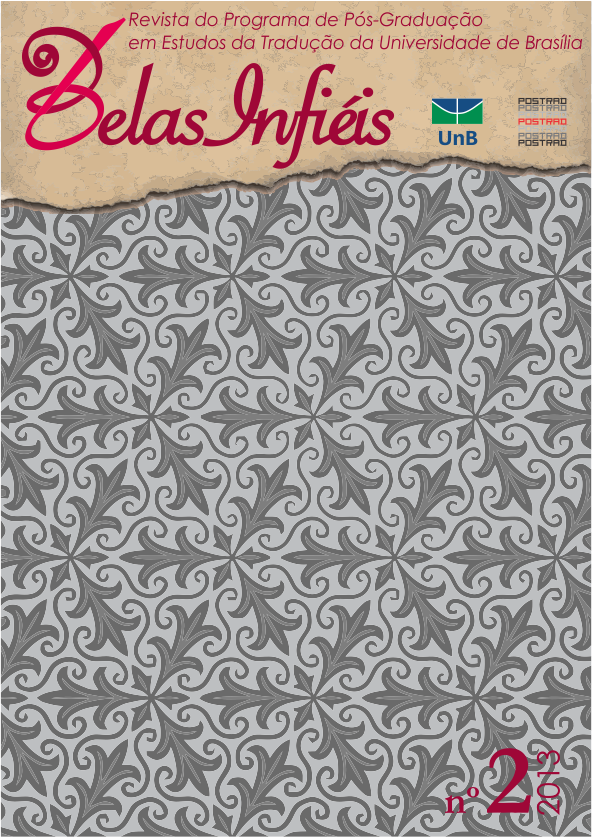NOMINAL GROUPS AS AN INDICATOR OF NON-NATIVE ENGLISH COMMUNICATION PROBLEMS IN TOP-RANKED BRAZILIAN SCIENCE JOURNALS
DOI :
https://doi.org/10.26512/belasinfieis.v2.n2.2013.11246Mots-clés :
globalization, scientific discourse, lingua franca, SciELORésumé
This study is an attempt to document the problematic nature of an intermediary linguistic system, the lingua franca used by the scientific community, on the production and impact of science from the broad area beyond the inner circle of native English speakers. To this end, a random cross-sectional sample (n=5) of current English-language articles from top-ranked journals in the Brazil-based metapublisher Scientific Electronic Library Online (SciELO) was examined for grammatical issues, especially nominative group construction. In the studied sample, varying and in some cases elevated levels of L1 interference were found, indicating that on the best collective level, there are proficiency problems with the lingua franca, that these problems are not evenly distributed and that systematic language management yielded vastly different language quality outcomes.
Téléchargements
Références
DE SWAAN, A. Words of the world:the global language system. Cambridge: Polity Press, 2001.
FISHMAN, J. Ethnolinguistic democracy: varieties, degrees and limits. In: Language International. 1993, v. 1, p.11-17.
GIBBS WW. Lost science in the third world. Scientific American. 1995; 273:76-83.
HALLIDAY, M.A.K. HALLIDAY, M. A. K/ WEBSTER, J. The Language of Science (Collected Works ofM.A.K. Halliday).Continuum: London/New York, 2004.
ILIESCU GHEORGHIU, C.; LAMBERT, J. (Eds.) Universe-cities as Problematic Global Villages:Continuities and Shifts in our Academic Worlds. EDUFSC, forthcoming.
KACHRU, B. B. Standards, codification andsociolinguistic realism: the English language in the outer circle. In: QUIRK, R. & WIDDOWSON, H.G. (Eds.). English in the world: Teaching and learning the languages and literatures. Cambridge: Cambridge University Press, 1985. p. 11-30.
MENEGHINI, R.; PACKER, A. L. Is there science beyond English? EMBO Reports, 2007, v. 8, p. 112-116. Available at: <http://www.nature.com/embor/journal/v8/n2/pdf/7400906.pdf> Accessed 02.02.2012.
ONG, W. Orality and literacy: the technologizing of the world. New York: Routledge, 2002.
OPTHOF, T. Sense and nonsense about the impact factor 1997. Cardiovascular Research 33 (1997) I-7
PACKER, A. CODATA 2007 -Strategies for Open and Permanent Access to Scientific Information in Latin America: Focus on Health and Environment Information for Sustainable Development. Atibaia, São Paulo, 8-10 May 2007
SCIMAGO JOURNAL RANKING 2011. Available at: <http://www.scimagojr.com/journalrank.php>. Accessed 02.02.2012.
SEGLEN, P. Why the impact factor of journals should not be used for evaluating research. BMJ:1997, 314, p. 498”“502.
TETREAULT, J.R.; CHODOROW, M. Native judgments of non-native usage: Experiments in preposition error detection. Proceedings of the Workshop on Human Judgements in Computational Linguistics. Association for Computational Linguistics, 2008
Téléchargements
Publié-e
Comment citer
Numéro
Rubrique
Licence
Copyright Statement
Given the public access to this journal, the texts are free to use but requires the recognition of the original authorship and initial publication in this journal to be properly stated.
The journal allows the use of works published for non-commercial purposes, including the right to submit the work to publicly accessible databases. Published contributions are the sole and exclusive responsibility of the author(s).
- When submitting papers to be evaluated by the Belas Infiéis journal, the author(s):
- Declare that the contents of the contributions are original and of their original creation, being entirely responsible for their content if there is an objection by third parties.
- Claim to be aware that they should not commit academic plagiarism.
- Declare that the manuscript has not been published, completely or partially, in Portuguese or another language. If it is a translation it should be submitted to the Translated Articles section.
- Declare that the manuscript is not being evaluated by other journals.
- Declare that the manuscript was not submitted to another journal simultaneously.
- Commit(s) to inform the journal of any kind of error or inaccuracy in their contribution (published, in evaluation or in editing) and to collaborate with the editors to make due corrections of the article (when in evaluation or editing) or erratum/retraction (after publication).
- Declare that there is no conflict of interest regarding the published work.
- Authorize its release if it is accepted for publication without any kind of monetary compensation.
- Agree to assign non-exclusive rights to publication to the magazine, remaining free to make their contribution available in other media as long as the publication of the first version in Belas Infiéis magazine is mentioned. They also authorize Belas Infiéis to assign their texts for reproduction in content indexers, virtual libraries and similar platforms.
- Maintain copyright and grant the journal the right of first publication, the work being licensed under theCreative Commons Attribution License.
- Is/Are allowed and encouraged to publish and distribute their work online after the editorial process, which may increase the impact and citation of the published work.
- Authorize the editorial team to make textual adjustments and to adapt the article to the publication rules, when necessary.



















